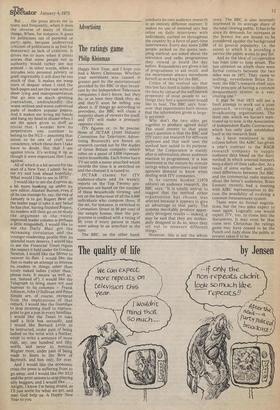Advertising
The ratings game Philip Kleinman
Happy New Year, and I hope you had a Merry Christmas. Whether your merriment was caused in greater part by the entertainment provided by the BBC or that broadcast by the Independent Television companies I don't know, but they do, or at least they think they do, and they'll soon be telling you about it. If things go according to precedent, the BBC will claim a majority share of viewers for itself, and ITV will make a precisely opposite claim.
ITV figures or, to be precise, those of JICTAR (Joint Industry Committee for Television Advertising Research) are based on research carried out by the Audits of Great Britain company, which relies on a panel of 2,650 representative households. Each home has a TV set with a meter attached which records the time it is switched on and the channel it is tuned to.
JICTAR claims for ITV audience-share and its weekly reports on the Top Twenty programmes are based on the number of these -households viewing, and not on the behaviour of all the 8,000 individuals who compose them, If the set, for instance, is switched to Coronation Street in 50 per cent of the sample homes, then the programme is credited with a rating of 50, even if every person in them were asleep in an armchair at the time.
The BBC, on the other hand, conducts its own audience research in an entirely different manner. It makes no use of metered sets but relies on daily interviews with individuals, carried on throughout the country by a force of part-time interviewers. Every day some 2,000 people, picked on the quota sampling method, are asked about the television and radio programmes they viewed or heard the day before. Respondents are given a list of programmes to aid recall, and the interviewer always introduces herself as working for the BBC.
Critics of the method say that this last fact itself is liable to distort the data by virtue of the well known propensity of most people to say things they feel a questioner would like to hear. The BBC says, however, that experiments have shown that the information given is largely accurate. Why don't the two sides get together to produce agreed data? The usual answer to that plain man's question is that the BBC and ITV carry out research for different purposes and that each uses the method best suited to its purpose. What the Corporation is mainly after is information about audience reaction to programmes; it is less interested in the minute-by-minute • ratings which advertisers and their agencies demand to know when dealing with ITV companies.
In its current booklet (1970 edition) on audience research, the BBC says: "It is totally untrue to suggest that the method either organisation has chosen was selected because it appears, to give an advantage to that party. The systems inevitably produce apparently divergent results — indeed, it may be said that they are deliberately designed to do so, since they set out to measure different things."
However, this is not the whole story. The BBC is also intensely interested in its average share of the total viewing public. It has to be since its demands for increases in the licence fee are bound to be considered against the background of its general popularity, i.e. the extent to which it is providing a service the public wants to pay for.
And so the idea of co-operation has from time to time arisen. The last occasion on which there were formal contacts between the two sides was in 1971. They came to 'nothing; nevertheless Brian Emmett, the BBC's research chief, says "the principle of having a common measurement system is a very alluring one." It may be that 1975 will see a fresh attempt to work out a joint approach, involving all three broadcasting organisations. The third one, which we haven't mentioned up to now, is the Association of Independent Radio Contractors, which has only just established 'itself in the research field.
As I have mentioned in this column before, the AIRC has given a year's contract to the RSGB research company to supply audience data based on the diary method; in which selected listeners keep a diary of their radio diet. As a result of some earlier, well publicised differences between the BBC and the commercial radio stations about the latter's audiences, Brian Emmett recently had a meeting with AIRC representatives to discuss the possibility of evolving a common measurement system.
There were no formal negotiations, but the two sides expect td meet again. Logically one would expect ITV, too, to come into the discussions. It may even be that come next Christmas the ratings game may have ceased to be the Punch and Judy show the public at present takes it to be.


























 Previous page
Previous page